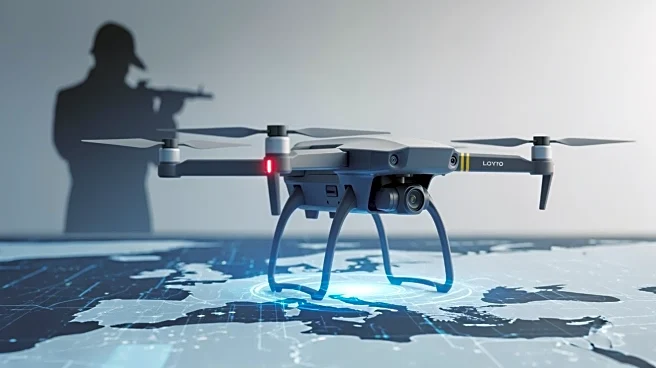What's Happening?
North Korea's Lazarus threat group has been identified as the perpetrator behind cyberattacks on three European companies involved in the defense sector, according to a report by ESET researchers. These
attacks, which occurred last spring, aimed to steal sensitive data related to drone components and software. The targeted companies include a metal engineering firm, an aircraft component manufacturer, and a defense company, all of which supply military equipment, some currently used in Ukraine. The attacks are part of Lazarus's Operation DreamJob campaign, which uses fake job offers as a social engineering tactic to gain access to targeted networks. The group deployed a remote access trojan, ScoringMathTea, to gain control over compromised systems, focusing on drone technology.
Why It's Important?
The cyberattacks by North Korea's Lazarus group highlight the ongoing threat of state-sponsored cyber espionage, particularly in the defense sector. By targeting companies involved in drone technology, North Korea seeks to bolster its own military capabilities, potentially gaining insights into advanced drone manufacturing. This poses a significant risk to global security, as the stolen information could enhance North Korea's military technology, affecting geopolitical stability. The attacks also underscore the vulnerability of defense contractors to sophisticated cyber threats, necessitating enhanced cybersecurity measures to protect sensitive information.
What's Next?
Organizations within the drone and defense sectors may need to reassess their cybersecurity strategies to mitigate the risk of similar attacks. Governments and international bodies might increase pressure on North Korea through diplomatic channels or sanctions to deter further cyber espionage activities. Additionally, companies may collaborate with cybersecurity firms to develop more robust defenses against such advanced persistent threats.
Beyond the Headlines
The use of social engineering tactics, such as fake job offers, in these attacks highlights the evolving nature of cyber threats, where human factors are exploited alongside technical vulnerabilities. This development calls for increased awareness and training among employees to recognize and respond to such tactics. Furthermore, the focus on drone technology suggests a strategic interest by North Korea in enhancing its unmanned aerial capabilities, which could have long-term implications for regional military dynamics.








